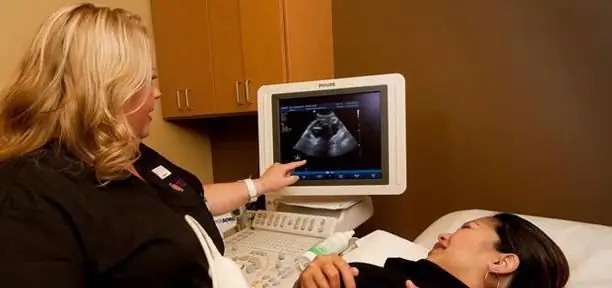2026 Author: Priscilla Miln | miln@babymagazinclub.com. Last modified: 2025-01-22 17:55:22
Don't be scared if the local pediatrician offers to take your child for an abdominal ultrasound. Do not refuse this study, it does not affect the functioning of the baby's body in any way, does not cause him pain and does not irradiate him.
When is an ultrasound indicated?

Ultrasound of the abdominal cavity for children under one year old is done in the following cases:
- to assess the development of internal organs and confirm the absence / presence of anomalies;
- with jaundice in newborns;
- with frequent regurgitation. At the same time, it is also necessary to check if there are signs of a pathology of brain development;
- with poor weight gain;
- with liquid frequent stools, without signs of concomitant infection;
- if you suspect pylorospasm or pyloric stenosis, the symptoms of which are identical.

But this is not a complete list of indications for which abdominal ultrasound is prescribed for children. So, for grown-up babies, such a study is necessary when:
- abdominal pain;
- feeling of heaviness and tension in the righthypochondrium;
- bitterness in the mouth, sour belching, bad breath;
- jaundice;
- flatulence.
In addition, any injury to the abdominal region is a direct indication for an ultrasound if accompanied by pain, and it must be done as soon as possible.
Preparing for the procedure
An abdominal ultrasound for children does not cause pain or severe discomfort, it is not scary. But it is necessary to properly prepare for it and not feed the child before the procedure:
- for newborns, the fasting period is about 3 hours;
- for babies under 3 years old - 4 hours;
- children over 3 years of age should not eat for at least 6 hours.
When breastfeeding, a mother needs to give up foods that cause gas formation in the intestines (legumes, raw fruits and vegetables, brown bread, kvass, various sweets, juices, pastry, milk, etc. on the recommendation of a doctor). Children under 3 years of age should not eat vegetable and fruit purees or drink juices on the day of the study. But before an ultrasound of the abdominal cavity, children who are over 3 years old require more thorough preparation. They must be put on a three-day diet that excludes gas-producing foods. On the day of the study, you can only drink plain water.
How and where is an ultrasound done
If the district pediatrician sends you for an ultrasound, then you will most likely have it free of charge at the clinic. But if the children's hospital does not have equipment, specialists, or you want to double-check the results, then you can find out where else you can do an ultrasound of the child's abdominal cavity. The price of such a study is practically the same as the cost of a similar procedure for adults; in most cases, it depends on the clinic you have chosen. But keep in mind that only children's specialists should look at babies. A doctor specializing in adults will not be able to adequately evaluate the results of the diagnosis performed on the baby.

As a result of the study, a number of problems can be identified, such as:
- hepatitis (acute and chronic forms are visible);
- stones and clots in the gallbladder;
- cysts and neoplasms in the liver, congestion in it;
- pathology of the spleen (enlargement, the appearance of additional lobes) or its injury, heart attack;
- peritonitis;
- signs of pancreatitis;
- swollen lymph nodes.
Never underestimate the need for an ultrasound of the child's abdomen. The transcript of the results obtained must be announced to the parents and transferred to the pediatrician. The final diagnosis is already established by the pediatrician, while he can prescribe additional studies, recommend treatment or consultations with other specialized specialists.
Recommended:
Identification and development of gifted children. Problems of gifted children. School for gifted children. Gifted children are

Who exactly should be considered gifted and what criteria should be followed, considering this or that child the most capable? How not to miss the talent? How to reveal the hidden potential of a child who is ahead of his peers in terms of his level of development, and how to organize work with such children?
Why do you need a wife? How to become a smart wife? Does a modern man need a wife

In today's world, family values are greatly distorted. The reason is simple: women and men have gained equal rights, and instead of building a simple nest, we give ourselves completely to a career and an illusory perspective. But let's find out why a wife is needed and whether it is important to register a marriage in the 21st century
Norm for screening ultrasound of the 1st trimester. Screening of the 1st trimester: terms, norms for ultrasound, ultrasound interpretation

Why is 1st trimester perinatal screening done? What indicators can be checked by ultrasound in the period of 10-14 weeks?
Topical questions about relationships: why do you need a mistress or lover? Is this correct or not? Why do people change?

All these questions are too topical today. Even more than it should. In the modern world, people have completely ceased to value relationships and their chosen ones. And betrayal is not considered something to be ashamed of. Well, it's worth talking about this topic and shedding light on some facts
Why do we need children? Complete family. Adopted children

Recently it has become fashionable to have many children. But is it worth following a social fashion if in your heart you do not agree with the need to satisfy the simplest of instincts - the instinct of procreation? If you doubt and constantly wonder why you need children, it's time to establish your own priorities in life

